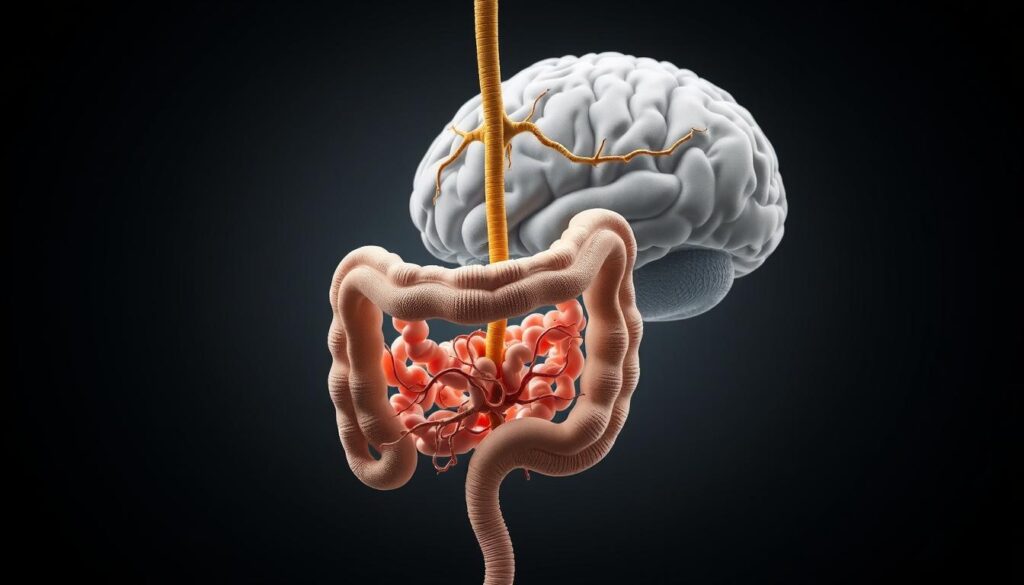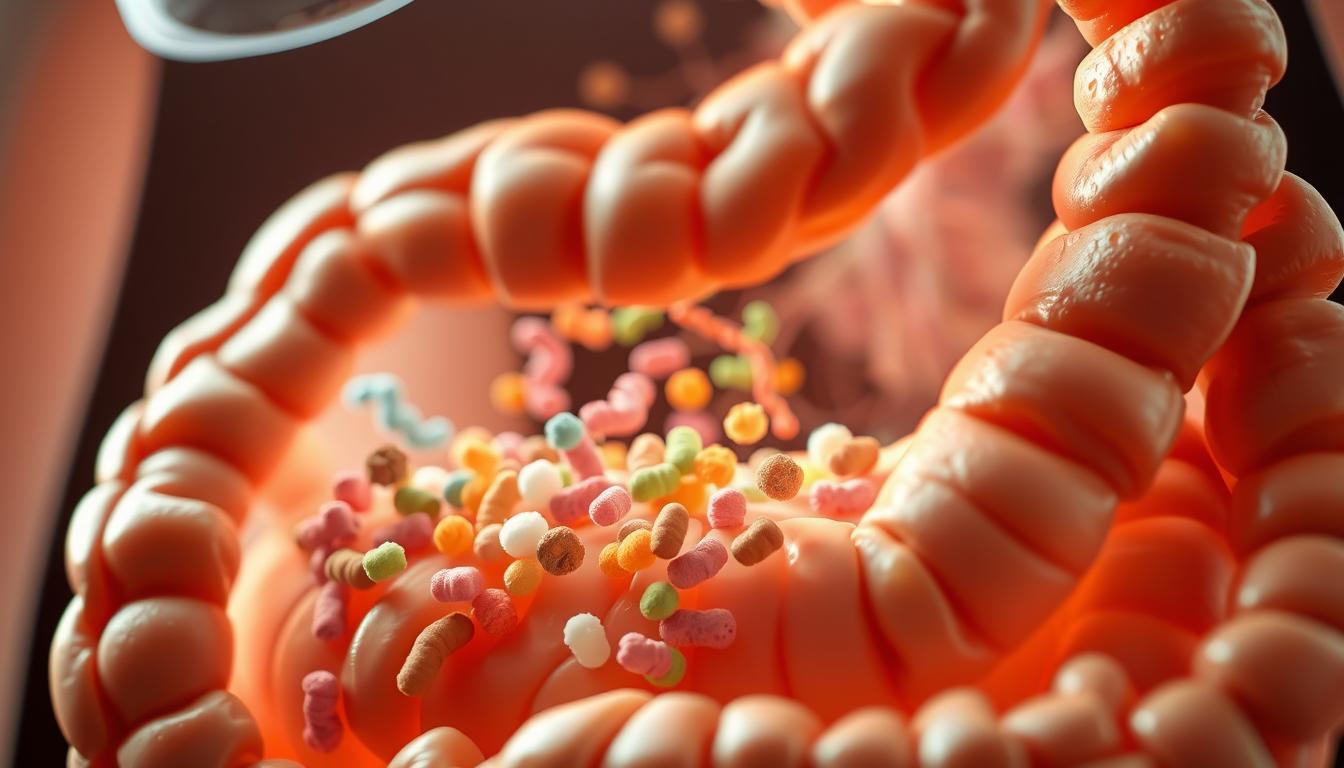Did you know that nearly 90% of your body’s serotonin, a key neurotransmitter that regulates mood, is produced in your gut? This astonishing fact highlights the profound connection between your gut health and brain function, often referred to as the gut-brain axis.
The gut-brain axis is a complex communication network between your gut microbiome and your central nervous system. Maintaining a healthy balance in this axis is crucial for overall well-being, influencing not just your mood, but also your cognitive function and immune response.
Fortunately, there are several effective strategies to support your gut-brain axis without resorting to medication. By incorporating these into your daily routine, you can enhance your mental clarity, boost your mood, and improve your overall health.
Key Takeaways
- Maintaining a healthy gut-brain axis is crucial for overall well-being.
- Diet plays a significant role in supporting gut health.
- Probiotics and prebiotics can enhance gut microbiome balance.
- Stress management techniques can positively impact the gut-brain axis.
- Adequate sleep is essential for a healthy gut-brain connection.
Understanding the Gut-Brain Connection
Understanding the gut-brain axis is crucial for appreciating how our digestive system affects our brain function and vice versa. The gut and the brain are connected through a complex network of neurons, hormones, and biochemical signaling pathways.
What is the Gut-Brain Axis?
The gut-brain axis refers to the biochemical signaling that takes place between the gastrointestinal tract and the central nervous system. This bidirectional communication network involves the exchange of information between the gut microbiota, the intestinal epithelium, and the brain.
The gut microbiota produces neurotransmitters and hormones that influence mood, cognitive function, and overall brain health. In turn, the brain sends signals to the gut, affecting gut motility, secretion, and blood flow.

How Your Gut Microbiome Influences Brain Function
The gut microbiome plays a crucial role in brain function and behavior. An imbalance in the gut microbiota, also known as dysbiosis, has been linked to various neurological disorders, including anxiety, depression, and neurodegenerative diseases.
Probiotics and prebiotics are essential for maintaining a healthy gut microbiome. Probiotics introduce beneficial bacteria into the gut, while prebiotics provide the necessary nutrients for these bacteria to thrive.
Recognizing Signs of an Unhealthy Gut-Brain Connection
An unhealthy gut-brain connection can manifest in various ways, including digestive issues, mood disorders, and cognitive impairment. Common signs include bloating, abdominal pain, anxiety, depression, and brain fog.
Recognizing these signs is crucial for taking corrective action to restore balance to the gut-brain axis. This can involve dietary changes, lifestyle modifications, and targeted supplementation.
Optimize Your Diet for Gut-Brain Health
The food you eat has a profound impact on both your gut microbiome and brain function. A diet rich in essential nutrients and beneficial compounds can support the health of your gut-brain axis, leading to improved overall well-being.
Add These Probiotic-Rich Foods to Your Meals
Probiotics are live microorganisms that confer health benefits when consumed in adequate amounts. Incorporating probiotic-rich foods into your diet can enhance gut diversity and support brain health.
Fermented Foods for Gut Diversity
Fermented foods are a rich source of probiotics. Examples include:
- Yogurt (with live cultures)
- Sauerkraut
- Kimchi
- Kefir
- Miso
Daily Probiotic Food Options
Including probiotic-rich foods in your daily meals can be simple. Try adding yogurt to your breakfast or having a side of sauerkraut with your lunch.
Incorporate Prebiotic Foods for Microbiome Support
Prebiotics are non-digestible fibers that serve as food for beneficial microbes in your gut, promoting a healthy gut microbiome. Foods rich in prebiotics include:
- Asparagus
- Bananas
- Onions
- Garlic
- Whole wheat bread
Choose Anti-inflammatory Foods That Benefit Both Systems
A diet rich in anti-inflammatory foods can help reduce inflammation in both the gut and brain. Examples of anti-inflammatory foods include:
- Fatty fish (salmon, sardines)
- Turmeric
- Ginger
- Leafy greens (spinach, kale)
- Nuts and seeds (walnuts, chia seeds)
Foods to Eliminate for Better Gut-Brain Function
Certain foods can disrupt the balance of your gut microbiome and negatively impact brain function. It’s beneficial to limit or avoid:
- Processed foods high in sugar and unhealthy fats
- Foods containing artificial additives and preservatives
- High-sodium foods
- Foods that you may be sensitive or intolerant to (e.g., gluten, dairy)
By making informed dietary choices, you can support the health of your gut-brain axis, potentially leading to improved mental clarity, mood stability, and overall well-being.
Natural Ways to Support Gut-Brain Axis Through Lifestyle Changes
Beyond dietary changes, lifestyle modifications play a crucial role in supporting the gut-brain axis. A comprehensive approach that includes regular exercise, effective stress management, and quality sleep can significantly enhance the health and communication between the gut and the brain.
Implement Regular Exercise Routines
Regular exercise is not only beneficial for physical health but also has a profound impact on both gut health and mental well-being. Exercise influences the gut microbiome by increasing the diversity of gut bacteria, which is essential for a healthy gut-brain axis.
Types of Exercise That Benefit Gut Health
Various forms of exercise can benefit gut health, including:
- Aerobic exercises like running or cycling
- Resistance training
- Yoga and other mind-body exercises
These exercises not only improve physical health but also contribute to a balanced gut microbiome.
Creating a Sustainable Exercise Schedule
To reap the benefits of exercise for gut health, it’s essential to create a sustainable exercise schedule. Aim for at least 30 minutes of moderate-intensity exercise per day, and incorporate activities that you enjoy to ensure long-term adherence.
Practice These Stress Management Techniques
Stress can significantly impact the gut-brain axis, making stress management crucial for overall health. Techniques such as meditation, deep breathing exercises, and mindfulness practices can help reduce stress levels.
Meditation, in particular, has been shown to positively affect the gut microbiome by reducing inflammation and improving gut barrier function.
Improve Sleep Quality to Enhance Gut-Brain Communication
Quality sleep is vital for the health of both the gut and the brain. Poor sleep can disrupt the balance of the gut microbiome and impair communication between the gut and the brain.
To improve sleep quality, establish a consistent sleep schedule, create a relaxing bedtime routine, and avoid screens before bedtime.
Effective Supplements and Natural Remedies
The gut-brain axis can be significantly supported through the use of targeted supplements and natural health remedies. By incorporating the right supplements into your daily routine, you can enhance gut health and, subsequently, brain function.
Selecting the Right Probiotic Supplements
Probiotics are live bacteria and yeasts that are beneficial for gut health. When selecting a probiotic supplement, it’s crucial to choose a product that contains strains known to support mental health.
Strain-Specific Benefits for Mental Health
Different probiotic strains offer unique benefits. For example, Lactobacillus rhamnosus and Bifidobacterium longum have been shown to reduce symptoms of anxiety and depression.
Dosage Guidelines and Timing
The effective dosage of probiotics can vary, but typically ranges from 1 to 10 billion CFU (Colony-Forming Units) per day. It’s recommended to take probiotics with meals to enhance survival through the digestive tract.
Herbal Remedies That Support Gut Healing
Certain herbal remedies can support gut healing and overall gut-brain health. These include:
- Slippery Elm: Known for its soothing effects on the gut lining.
- Marshmallow Root: Helps in reducing inflammation in the digestive tract.
- Licorice Root: Supports the health of the gut lining and promotes healing.
Key Nutrients That Boost Serotonin Production
Serotonin is a neurotransmitter that plays a crucial role in mood regulation. Certain nutrients can boost serotonin production, including:
- Omega-3 Fatty Acids: Found in fish oil, these support brain health.
- Vitamin D: Essential for overall health and mood regulation.
- Tryptophan: An amino acid that serves as a precursor to serotonin.
By incorporating these supplements and natural remedies into your lifestyle, you can support the health of your gut-brain axis and potentially improve your mental well-being.
Nurturing a Healthier Gut-Brain Axis
Supporting the gut-brain axis is crucial for overall well-being. By understanding the intricate connection between the gut microbiome and brain function, individuals can take proactive steps towards a healthier life. A balanced diet rich in probiotics, prebiotics, and anti-inflammatory foods plays a significant role in maintaining gut health.
In addition to dietary changes, incorporating regular exercise, stress management techniques, and improving sleep quality can significantly enhance the gut-brain connection. Supplements such as probiotics and certain herbal remedies can also provide support. By adopting these natural ways to support the gut-brain axis, individuals can promote a more balanced and resilient gut-brain communication.
Embracing a holistic approach that combines dietary modifications, lifestyle changes, and targeted supplementation can lead to improved gut health and overall wellness. By prioritizing the gut-brain axis, individuals can take a significant step towards achieving optimal health.
